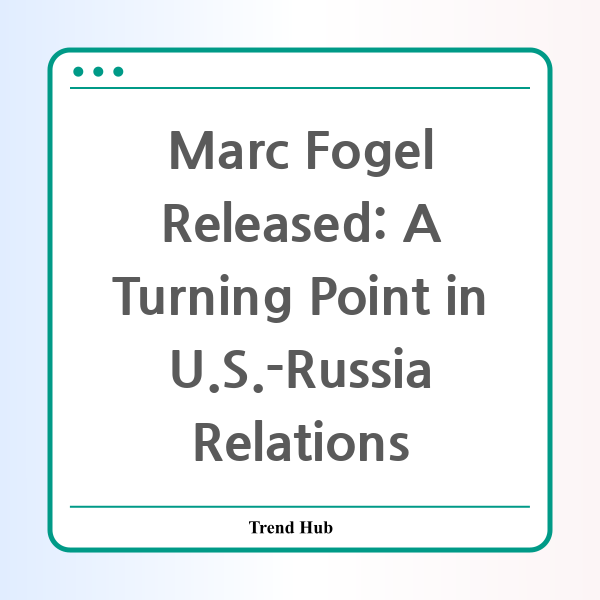* This website participates in the Amazon Affiliate Program and earns from qualifying purchases.

Will the release of Marc Fogel pave the way for better U.S.-Russia relations?
After nearly four years of being wrongfully detained in Russia, American schoolteacher Marc Fogel is finally free. His release, announced by the White House, marks a significant moment in the ongoing diplomatic efforts between the United States and Russia, particularly during a time marked by escalating tensions due to the war in Ukraine.
Fogel, who was sentenced to 14 years in a Russian prison for possessing medical marijuana, was arrested in 2021 under controversial circumstances. His case drew attention not only for the charges but also for the conditions surrounding his detention, which many have classified as politically motivated. As officials declared him "wrongfully detained," efforts intensified to negotiate his release.
On February 11, 2025, the White House confirmed that President Donald J. Trump and his Special Envoy Steve Witkoff successfully negotiated an exchange that would bring Fogel back to American soil. The announcement came from national security adviser Mike Waltz, who framed this development as a sign of goodwill from Russia and a step towards improving bilateral relations.
As tensions continue to simmer between the U.S. and Russia, this moment signifies more than just the personal victory for Fogel and his family. It is also a potential turning point in diplomatic relations, raising hopes for further negotiations that could influence other high-profile cases, including those of other Americans detained abroad.
Waltz stated, "By tonight, Marc Fogel will be on American soil and reunited with his family and loved ones thanks to President Trump’s leadership." This statement not only highlights the personal implications of Fogel’s release but also underscores the larger political narrative surrounding U.S.-Russian diplomacy. The interplay of diplomacy surrounding prisoners could indicate a shift in how both nations might engage with each other moving forward.
The negotiations for Fogel's freedom also reflect a more strategic approach as geopolitical landscapes evolve. As nations grapple with the impacts of ongoing conflicts, including the war in Ukraine, each release and negotiation could potentially signal a thawing of relations, or at least a willingness to dialogue over crucial issues.
Key Points to Consider:
- Background on Fogel’s Case: Detained since 2021, Marc Fogel's arrest was primarily due to drug charges in Russia, which have been perceived by many as a pretext for broader political leverage.
- Diplomatic Efforts: The successful negotiation led by President Trump and envoy Witkoff may open avenues for similar negotiations in the future, potentially involving other Americans held overseas.
- Impact on U.S.-Russia Relations: This development is not just about one man’s freedom; it could signal a broader willingness for both nations to pursue constructive dialogue to resolve outstanding issues.
- Potential Legacy: The outcome of Fogel’s release could be examined in future discussions about U.S. foreign policy in relation to Russia, particularly in terms of human rights and wrongful detentions.
As we reflect on this significant moment, the focus shifts to what lies ahead for both Marc Fogel and the diplomatic efforts between the United States and Russia. This release may serve as a beacon of hope, not just for those advocating for human rights, but also for a resumption of constructive dialogue amidst the complexities of international relations.
Stay tuned for updates on how this story continues to unfold and what it may mean for the future of U.S.-Russia relations.
* This website participates in the Amazon Affiliate Program and earns from qualifying purchases.